15 Best Crypto Wallets in Australia for April 2024
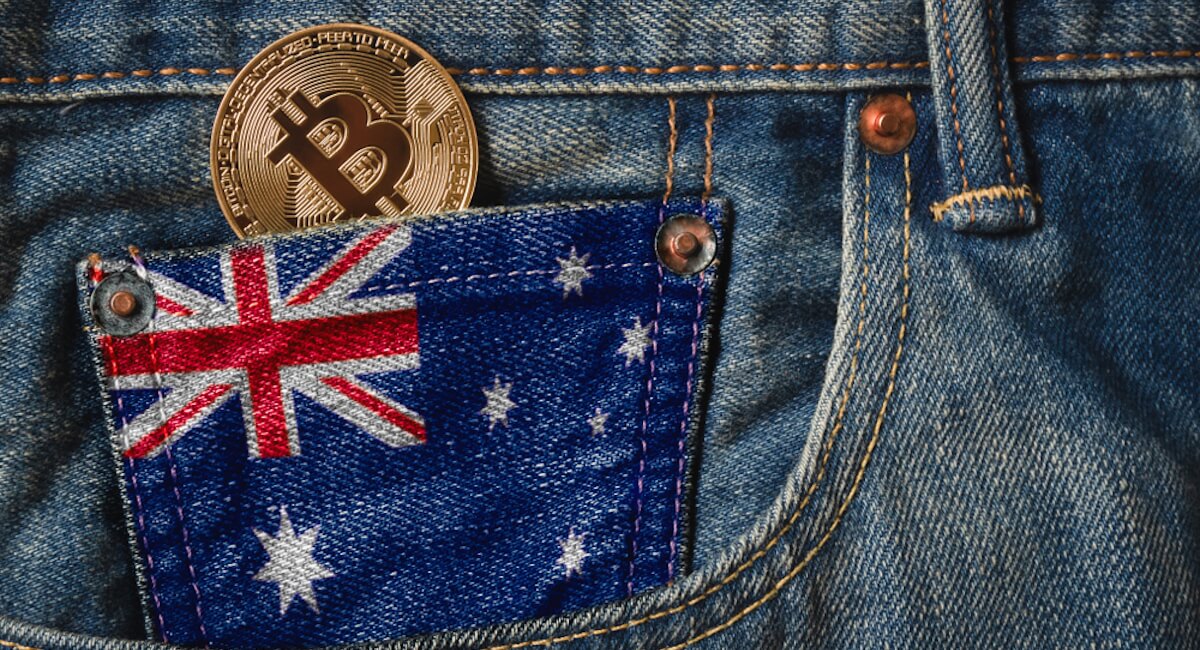
Crypto wallets are an integral part of Web3 and choosing the right one can be the difference between an excellent and a mediocre Web3 experience.
There are two categories of crypto wallet, cold wallets, for secure asset storage, and hot wallets, for quickly and easily interacting with the blockchain and dApps. Most people typically have both, a cold wallet for storing the majority of their assets long term, and a hot wallet with fewer funds and used for daily activity.
In this article, we cover the best hot and cold crypto wallets in Australia, along with how we selected them, and what you should look for in a crypto wallet in Australia.
The Best Crypto Wallet for Every Kind of Australian Crypto Holder
Here we’ve summarized the best cold and hot wallets separately so you can easily find the best wallet to suit your needs.
Best Hot Wallets in Australia
- Bybit: Best hot crypto wallet in Australia, with an integrated dApp aggregator, ideal for those new to web3.
- Zengo: Highly secure, mobile hot wallet that, with over 1 million customers, has never had a reported hack.
- Binance: Browser extension wallet connected to the world’s biggest cryptocurrency exchange.
- Best Wallet: Multi-chain crypto wallet with an upcoming token airdrop for active users and built-in DEX.
- CoinSpot: Multi-chain mobile app wallet with direct AUD deposits and withdrawals.
- CoolWallet: Decentralized crypto wallet with Web3 browser and smart contract security scanning.
- SafePal Wallet: A mobile app and a browser wallet with over 10,000 cryptocurrencies and NFT support.
- Coinbase: Extremely user-friendly wallet from one of the most popular crypto exchanges.
- MetaMask: Best non-custodial wallet for true asset self-custody and access to Ethereum Layer 2s.
Best Crypto Cold Wallets in Australia
- Ellipal Titan 2.0: Fully air-gapped cold wallet that is the best crypto hardware wallet in Australia.
- Ledger Nano X: Bluetooth-enabled hardware wallet with support for over 5,500 coins and tokens
- Ngrave Zero: Premium cold wallet with the highest OS security certification and biometric security.
- Ledger Nano S Plus: Budget-friendly alternative to Ledger Nano X, with all the features except Bluetooth connectivity.
- Trezor Safe 3: Highest spec device, supporting over 9,000 cryptos, from the most trusted company in hardware wallets.
Bybit – Beginner-Friendly Web3 Wallet With 1 Million Users
Bybit is shaping up to be the overall best crypto wallet in Australia and is the best custodial wallet available on the market today.
The Bybit Wallet is a custodial cryptocurrency wallet that offers Australian users direct access to the decentralized network of DeFi, GameFi, and NFTs while also securely holding their assets and private keys. Users of Bybit can easily create their wallets with just one click, giving them instant access to Web3.
Bybit Wallet stands out for how user-friendly it is, making it easy for beginners to navigate and engage with Web3 technologies It has an integrated dApp aggregator where users can explore and learn about various Web3 applications. Bybit Learn and Crypto Insights provide valuable educational content, offering insights into upcoming initiatives and demystifying the expansive Web3 ecosystem.
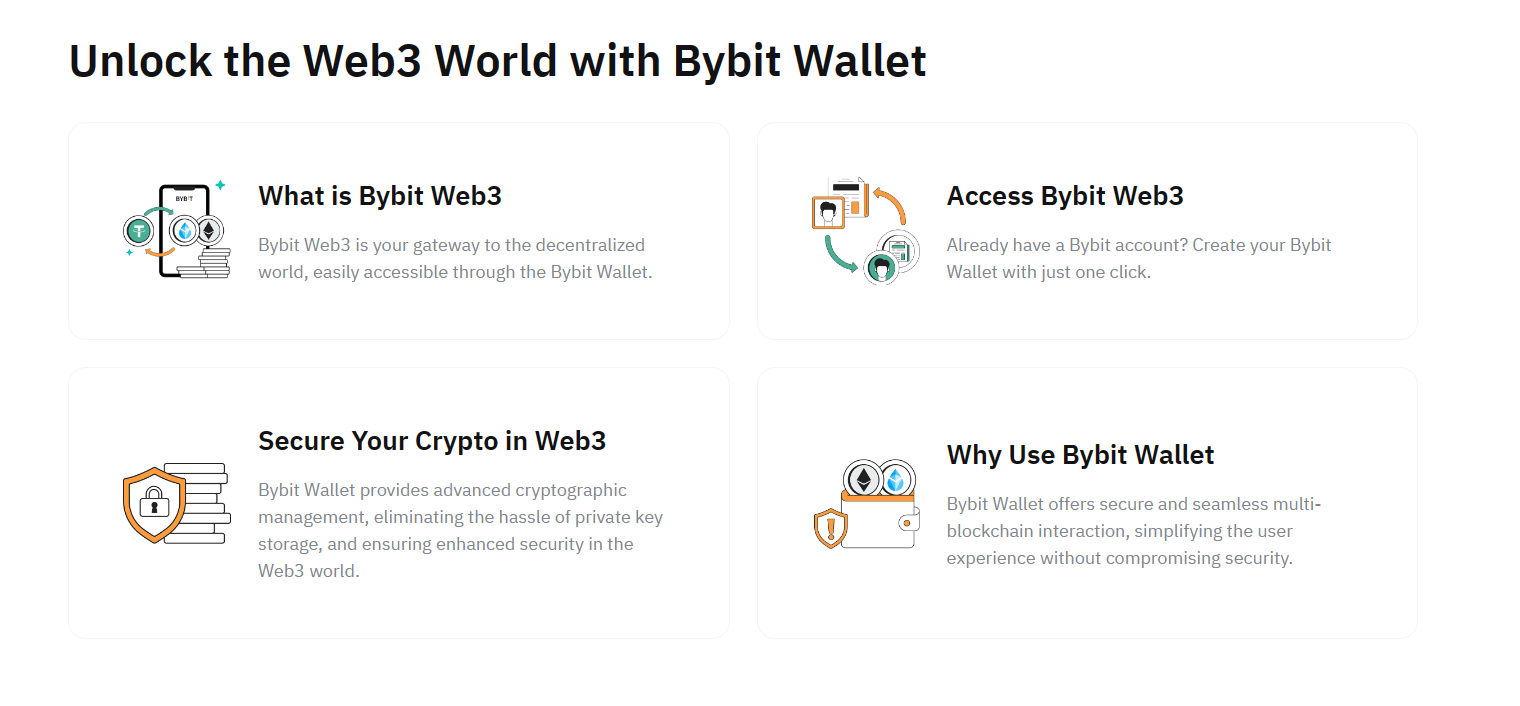
The wallet supports over 380 cryptocurrencies, and over $50 billion has been traded on the platform in the past 24 hours. The platform also offers a wide range of leveraged products, including perpetual futures with up to 100x leverage on Bitcoin. The platform stores the majority of its assets in cold storage and uses a range of security features, including 2FA.
Bybit has also recently launched a keyless self-custody wallet that uses Multiparty Computation (MPC) technology to secure users’ assets.
Pros
- 1 million wallet holders
- Useful educational content and info about upcoming airdrops
- Access to IDOs
- Support for over 380 cryptocurrencies
Cons
- Some features are more geared toward advanced traders
Zengo – Highly Secure and User-Friendly Mobile Hot Wallet
The Zengo mobile wallet is a self-custody wallet with support for over 120 cryptocurrencies and NFTs on multiple blockchains. It also offers users a dApp marketplace, where dApp connections are seamlessly facilitated through the industry-wide dApp connection standard, WalletConnect.
Users of this wallet can buy sell and trade cryptocurrencies and NFTs in-app, and, collectively, over 600 users have given Zengo a rating of 4.2 stars on Trustpilot. Zengo also has an exceptional security record with over 1 million customers and not a single reported hack—follow Zengo on X to keep up with wallet updates.
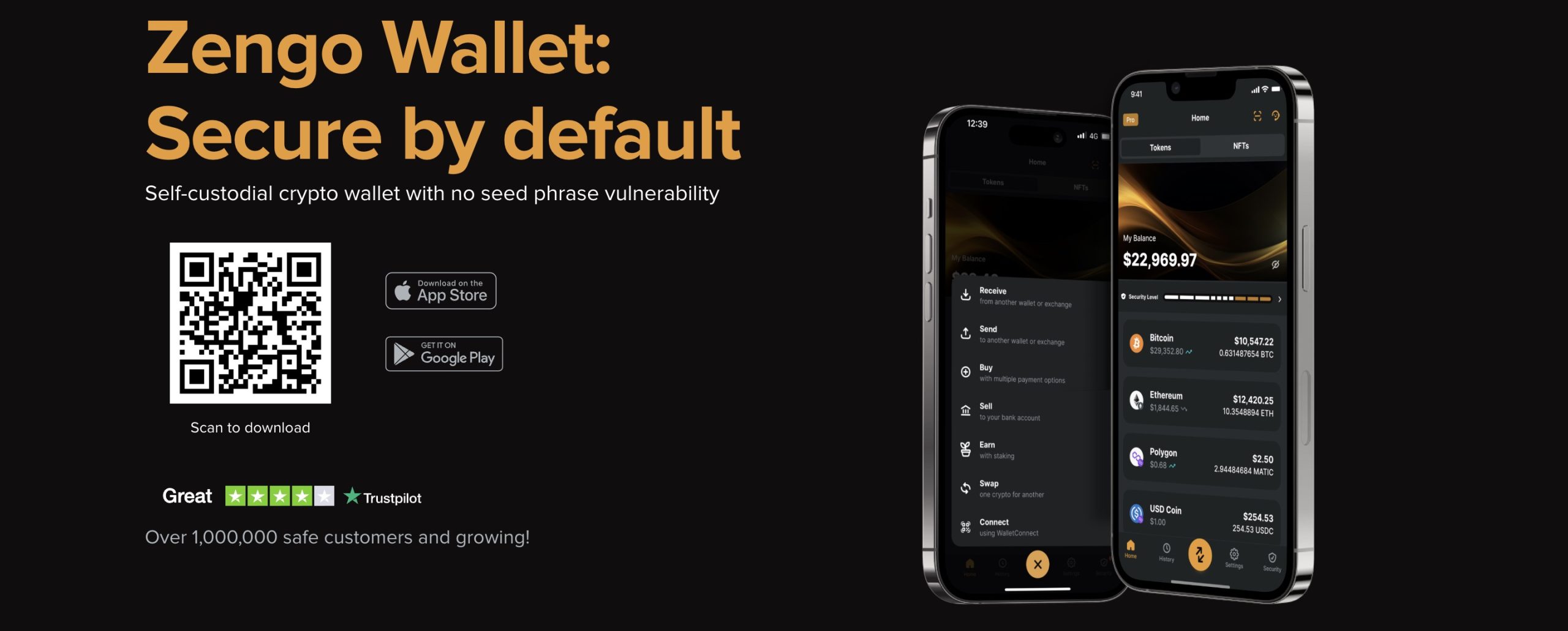
All of this—along with seed-phase-less recovery that uses a 3D face-scan, email address, and recovery file to recover a person’s wallet—is available in the free version of the app. However, those looking for extra security features can sign up for the Pro version ($69.99 per year) where they’ll get Theft Protection, a Web3 Firewall, access to Legacy Transfer services, and Priority Support.
Pros
- 1 million customers served not one hack reported
- Seed-phrase-less recovery process
- Uses WalletConnect for seamless and secure dApp connections
- Support for over 120 cryptocurrencies
Cons
- Number of blockchain tokens are limited by the Company
- Does not support most Ethereum layer 2s
Binance – Wallet from The World’s Largest Exchange
The Binance wallet is from the Binance crypto exchange and is available as a browser extension for Chrome and some of the world’s other most popular internet browsers. It offers users access to dozens of blockchains and a whole world of decentralized applications, allowing them to freely trade thousands of cryptocurrencies.
As a product of the Binance exchange, the Binance wallet offers a direct connection to the exchange, and users can transfer their funds between their self-custody wallet and exchange account in just a few clicks. They can also buy funds directly in the app using a bank transfer or credit card—follow Binance on X to keep up-to-date with the goings on with the app.
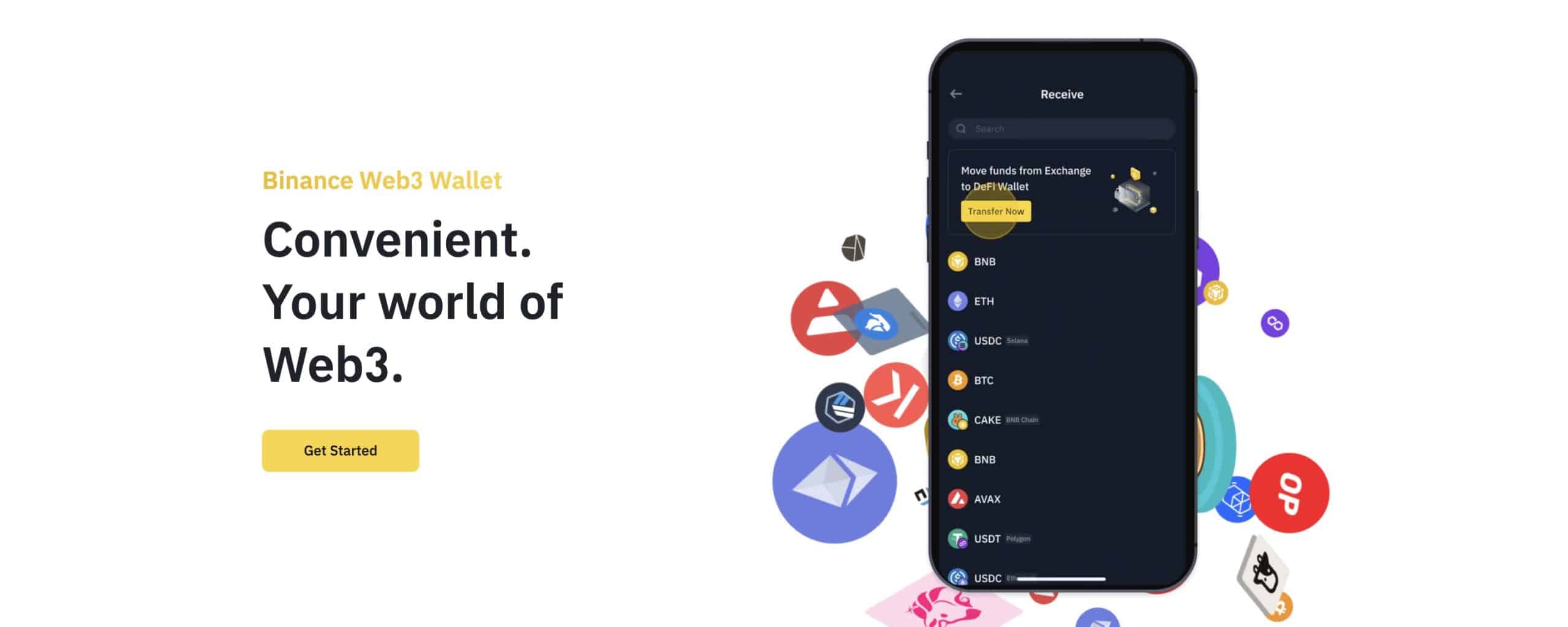
Through the wallet users can also swap tokens cross-chain, finding the lowest possible fees in the process. They can also stake a variety of assets through an earn protocol to earn a yield on their idle tokens.
Pros
- Access dozens of blockchains and dApps
- Support for thousands of cryptocurrencies
- Easily transfer assets to Binance exchange
- NFT support and connections to Binance’s NFT marketplace
Cons
- Only available as a browser extension
Best Wallet – Best New Wallet for 2024 with Upcoming Airdrop
Best Wallet is a hot wallet offering multi-chain support for all of the top blockchains, along with token and NFT support for many of those chains. This is all available in an intuitive and simple user interface for managing digital assets, along with a mobile app.
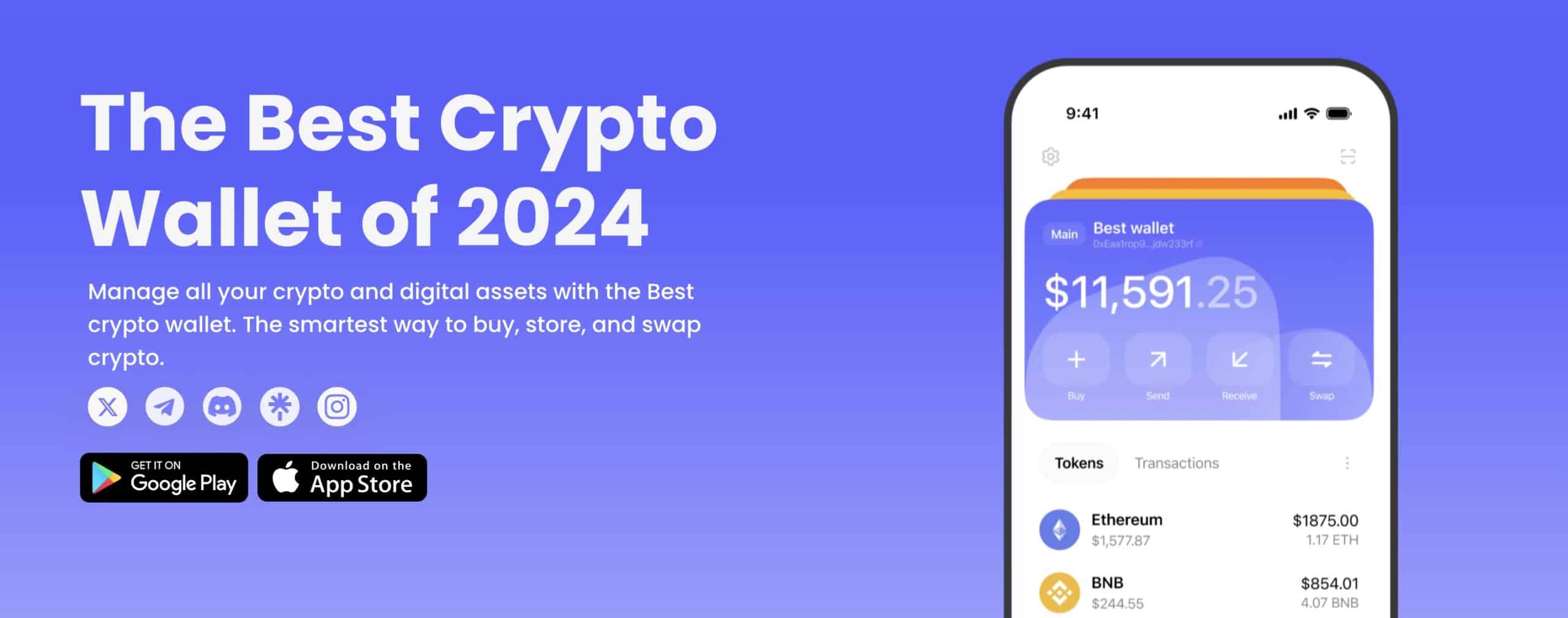
On top of all this, Best Wallet offers a DEX to users, enabling the trading tokens right there in the Best Wallet platform, and will soon offer token insights, including trending tokens and lists of upcoming token airdrops.
Finally, Best Wallet will be airdropping 10% of the $BEST token supply to active wallet users in the near future, and $BEST token holders will receive exclusive wallet benefits, including no gas fees and bonus airdrops. Learn more and keep up with updates on Best Wallet’s X and in their Telegram and Discord channels.
Pros
- Upcoming airdrop for active users
- Multi-chain, non-custodial wallet
- Support for tokens and NFTs on multiple chains
- Mobile app for asset management on the go
- Built-in DEX
Cons
- No known date for upcoming airdrop
CoinSpot – Multi-coin Wallet With Direct Deposits and Withdrawals
CoinSpot is a crypto exchange with over 2.5 million customers, offering over 360 cryptocurrencies to trade. To simplify crypto onboarding, the exchange has created one of the best crypto wallets that lets you store coins from various blockchains, such as Ethereum and Bitcoin. Buying coins is easy and comes with some of the lowest fees of 0.1%.
Aside from buying and storing coins, the wallet lets you directly deposit and withdraw AUD via PayID, direct deposit, cash deposit or BPAY. This makes it an excellent option for beginners who never bought crypto before. Seasoned traders, however, can deposit or withdraw any coin and token listed on CoinSpot from their own personal crypto wallets.
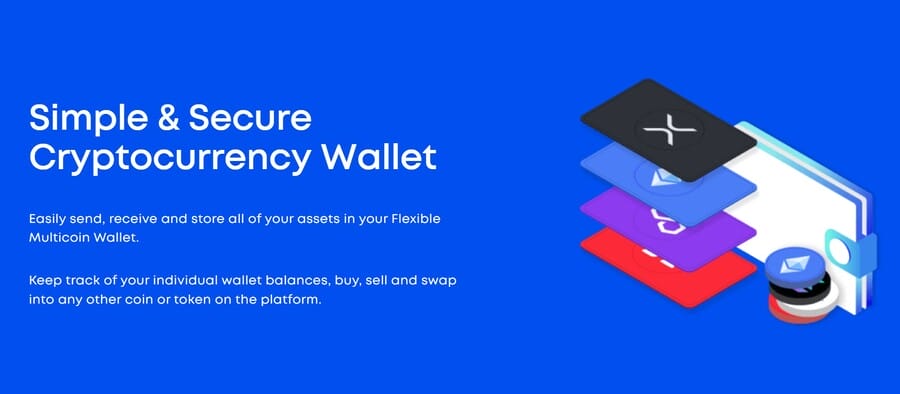
As far as security goes, CoinSpot has implemented two-factor authentication and an account-wide withdrawal ban to protect your assets. On top of that, CoinSpot uses offline storage to keep the coins safe, and have a HackerOne bug bounty program that rewards hackers who can manage to find exploits.
Pros
- Mobile app
- Support for thousands of cryptocurrencies
- AUD deposits and withdrawals
- Low crypto buying fees
Cons
- Lacks advanced trading features
CoolWallet – Advanced Crypto Wallet With Web3 Browser and Security Features
In addition to a hardware wallet, CoolWallet boasts an excellent hot wallet mobile app, which is packed with features such Web3 browser, real-time scanning and alerting, as well as multi-chain swaps. The Web3 browser is a powerful feature that lets you interact with dApps that require crypto wallets and transactions signing, such as Uniswap or OpenSea.
The Smart Scan feature is designed to give you peace of mind that you are interacting with the real dApps and not with fake applications. The way it works is you will see a notification on screen whether or not abnormalities are detected with the smart contract you’re interacting with.
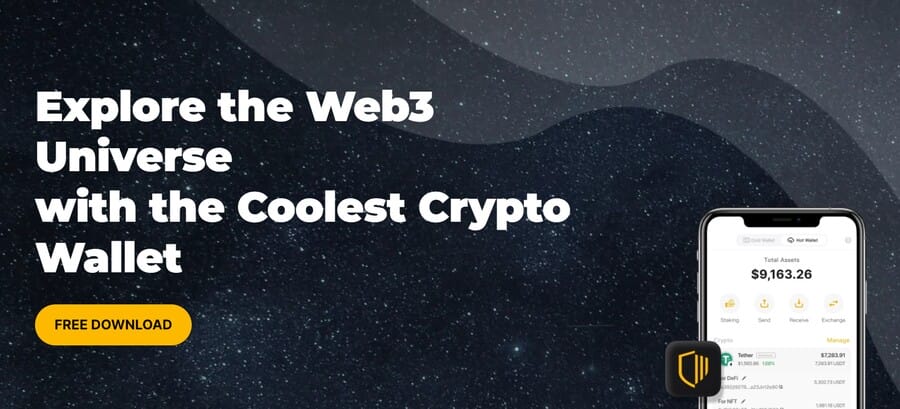
CoolWallet also supports NFTs. If you’re an enthusiast, store your digital collectibles in your wallet, list them on NFT marketplaces or swap them with other users.
Pros
- Mobile app
- Support for thousands of cryptocurrencies
- Web3 browser and security scanning of dApps
- NFT support
Cons
- Wallet is not open source
SafePal Wallet – Mobile App And Browser Extension With Over 10,000 Cryptocurrencies
SafePal offers hardware wallets and a wallet app, and the latter is impressive. It can store over 10,000 various cryptocurrencies and NFTs and it lets you monitor your connection with dApps. The standard buy, send and receive coins and tokens is also supported.
One of its most important features is integration with Binance where you can seamlessly spot trade or do cross-chain swaps. Moreover, the SafePal wallet lets you be your own bank, where you can utilize DeFi apps and stake your coins or do some yield farming.

Since the wallet lets you interact with dApps, you can play crypto games or interact with NFTs across various chains. All this makes SafePal an excellent choice for crypto enthusiasts looking for an all-in-one multi-chain crypto wallet.
Pros
- Spot trading integration with Binance
- Supports connection with DeFi dApps
- Multi-chain swaps
- Access to over 10,000 tokens and NFTs across multiple blockchains
Cons
- No live chat support
Coinbase – User-Friendly Wallet from NASDAQ Listed Exchange
The Coinbase exchange has been around since 2012 and made history when its COIN shares went public on the NASDAQ in 2021.
While being owned by one of the biggest exchanges, this wallet is a self-custody wallet, giving users complete control over their crypto assets. Coinbase’s wallet is available as a browser extension and as an app for smartphones and tablets, and supports hundreds of thousands of tokens and cryptos, alongside NFTs from top NFT chains Ethereum and Polygon.
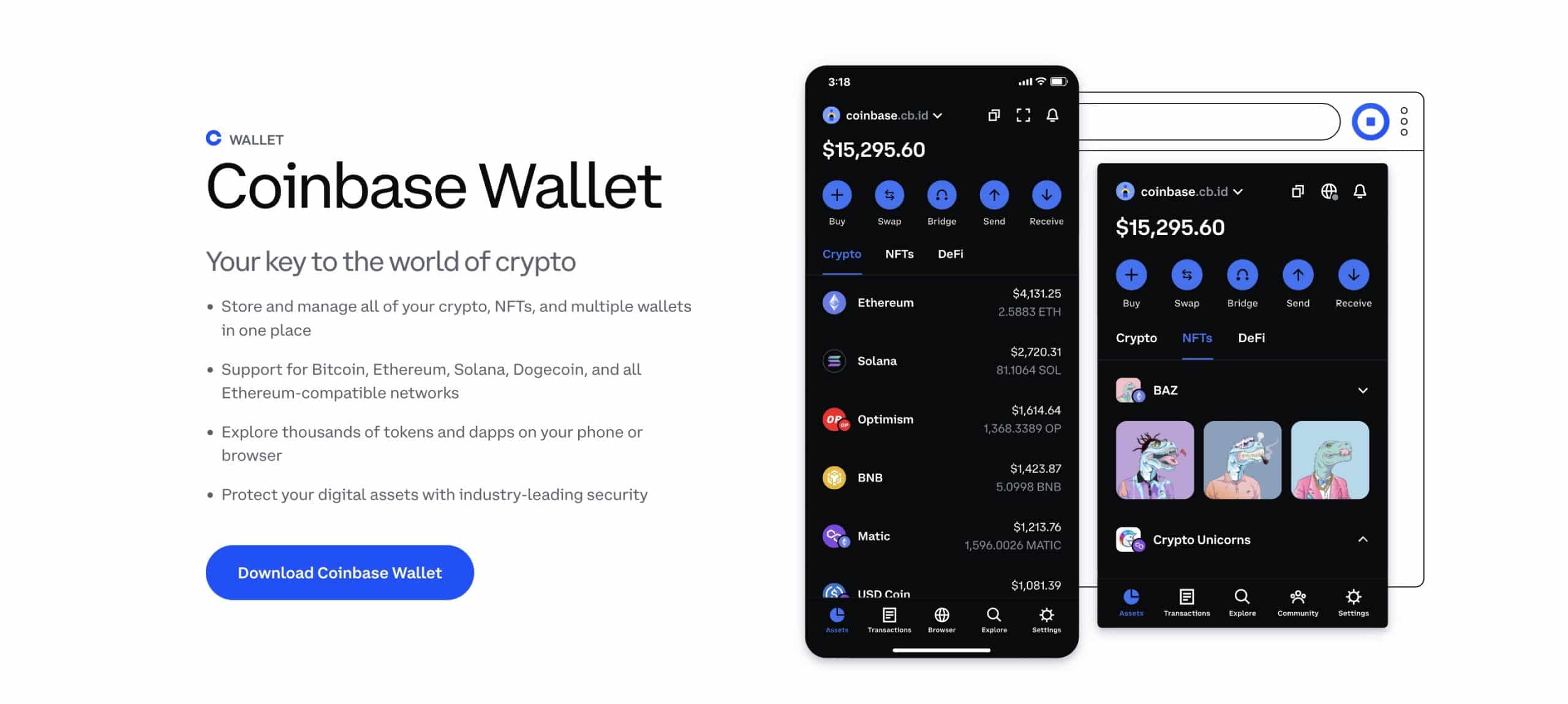
Users can access all manner of dApps using the Coinbase wallet and upgrades are happening regularly, so wallet users should follow Coinbase on X and the Coinbase blog.
Finally, because of its affiliation with one of the biggest exchanges, users can buy all manner of cryptos through the Coinbase wallet and it’s common called the best bitcoin wallet in Australia.
Pros
- Created by one of the most reputable exchanges in the world
- Support for hundreds of thousands of tokens
- Support for multi-chain NFTs
- Can buy top cryptos through the app’s connection to Coinbase exchange
- Can access dApps
Cons
- Is still reliant on Coinbase’s services
MetaMask – Best Wallet for Accessing Ethereum’s Ecosystem
The MetaMask wallet is considered one of the OG and non-custodial wallets for Web3, and it continues to keep pace with Web3 trends and rank amongst the best crypto wallets.
With it being one of the most popular wallets, users of MetaMask can connect to and use virtually any dApp. While originally being only a browser extension, MetaMask is now also available as a mobile app, allowing users to manage their funds on the go.

Through MetaMask users can connect to any EVM-based blockchain, which means that users can access the whole Ethereum ecosystem, including the numerous layer 2s—which are going to become even more popular after the rollup-focused Dencun upgrade is introduced later in 2024.
In their most recent announcement, the team behind MetaMask introduced MetaMask Snaps which allow developers to build enhancements and add-ons for MetaMask that users can then add at will. This significantly increases the utility of this wallet, allowing for functions like chatting, and also opening MetaMask up to non-EVM blockchains like Solana.
Pros
- Connect to the whole Ethereum ecosystem (including layer 2s)
- Arguably the most popular and widely integrated wallet in Web3
- New Snaps functionality allows for expanded wallet functions
- Available as a browser extension and mobile app
Cons
- No native connections to the Bitcoin network or non-EVM networks
Ellipal Titan 2.0- Air-Gapped Cold Wallet with 4″ Color Display
The Ellipal Titan 2.0 features no connectivity whatsoever—it is updated via micro SD card—and is highly focused on security. Having no possible connections to other devices might sound like it would make things harder, but the Ellipal Titan works by simply scanning a QR code to send transactions.
It features an anti-tamper functionality that erases the device’s data should someone try to break open the metal case to access its inner workings—major announcements are periodically posted to the Ellipal X account.
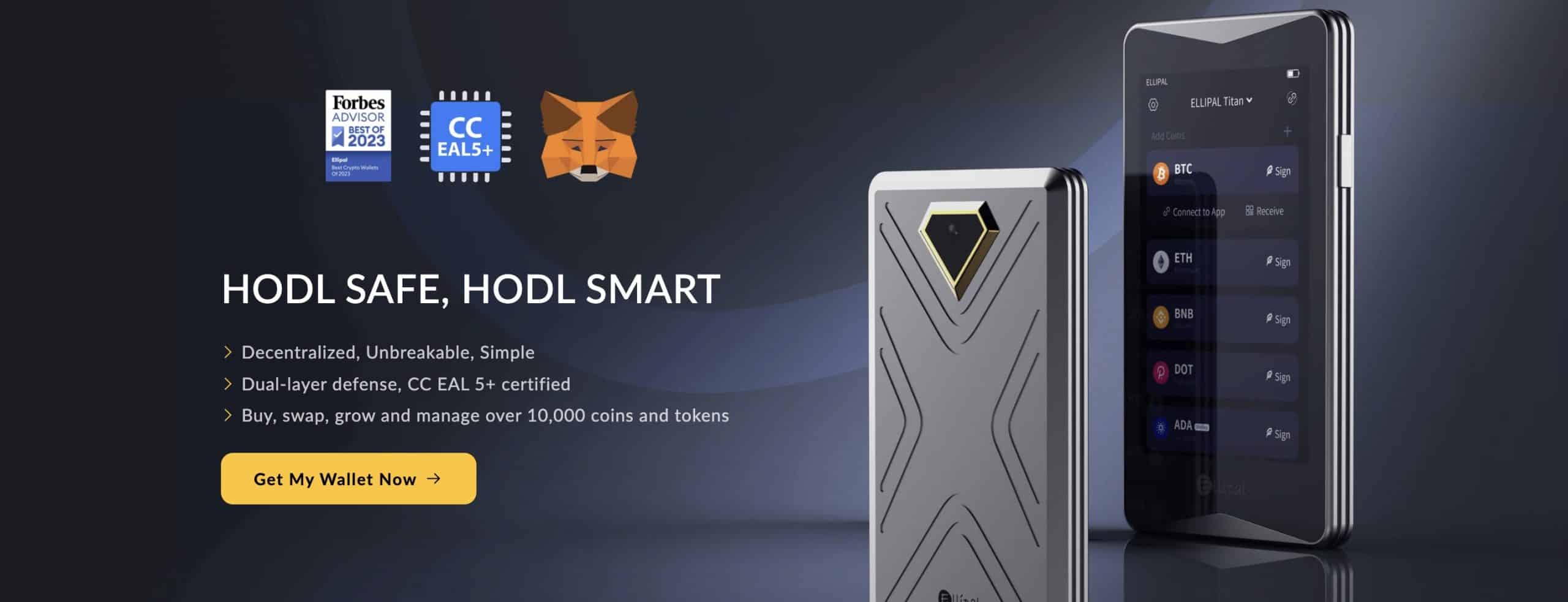
Users of Ellipal can access over 10,000 tokens, including the majority of top blockchain native tokens, along with ERC20, BSC, TRX, and HECO tokens. They can also store and view NFTs from Ethereum and Polygon. Staking is available for some blockchain native tokens like ADA, DOT, and ATOM.
Pros
- Extra secure for the highly security conscious
- Support for over 10,000 tokens
- NFT support for Ethereum and Polygon (with a 4″ viewing screen)
- Fully air-gapped with self-destruct tamper proofing
Cons
- Less popular so fewer audits conducted by professionals
- A short list of stake-able token
Ledger Nano X – Bluetooth Enabled Hardware Wallet Supporting 5,000+ Tokens
When the Ledger Nano X was first introduced it was the first major hardware wallet to integrate Bluetooth technology, allowing users to easily connect it to their mobile device to confirm and execute transactions and payments. Check out Ledger’s X account for all the latest updates.
The Ledger Nano X supports over 5,500 coins and tokens, covering all the major blockchain networks and tokens built on them, along with NFTs for many of the top NFT blockchains. Alongside Bluetooth connectivity, the Ledger Nano X can also be connected to via USB-C.

Users of the Ledger Nano X can use the Ledger Live app to interface with their devices and manage their cryptocurrencies. Here they can buy and sell crypto, as well as stake the native currencies of numerous blockchains. The Ledger Nano X is one of the best hardware wallets for storing your cryptocurrencies, including your winnings from some of the best real money casinos in Australia.
Pros
- Bluetooth connectivity for ease of use
- Access to over 5,500 cryptos
- Can buy, sell, and stake cryptocurrencies in app
- Can store tens of thousands of tokens and NFTs
- Mobile app for managing crypto in cold storage from mobile devices
Cons
- Previous security breaches, and the Ledger Recover release was harshly rejected for being too centralizing
Ngrave Zero – Premium Cold Wallet With Highest Security Certification
The Ngrave Zero is a premium hardware wallet that looks like a smartphone device. It boasts a color touchscreen where you can seamlessly sign transactions and monitor your portfolio. On top of that, Ngrave Zero comes with the highest security rating of EAL7. For comparison, some of the most popular cold wallets have an EAL5 or EAL6 certification.
There’s no wireless connection that could be potentially exploited, meaning transactions are signed via QR code scanning. With safety features like anti-tampering protection, fingerprint scanning and fully air-gapped, there’s no doubt that this is the safest cold wallet you can get.
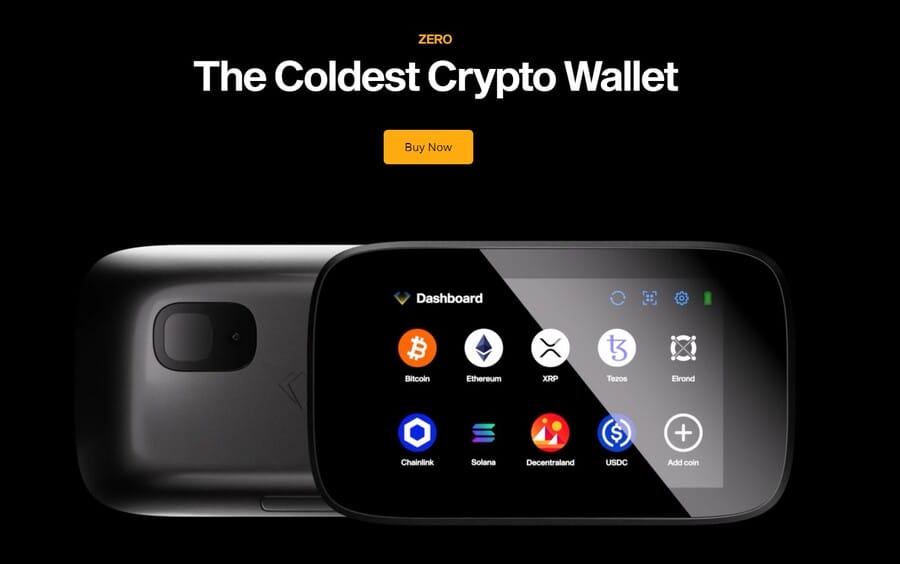
However, it’s also one of the most expensive wallets. If your portfolio is worth hundreds of thousands of dollars or more, Ngrave Zero is definitely worth considering. If your digital assets are worth less than $20k, consider other alternatives.
Pros
- Most secure crypto wallet
- Fully air-gapped
- Fingerprint sensor and QR camera for transaction signing
- Anti-tamper protection
Cons
- One of the most expensive cold wallets
Ledger Nano S Plus – The Best Value Crypto Hard Wallet in Australia
Ledger’s Nano S Plus is almost half the price of its Bluetooth enabled sibling, the Nano X, yet it offers all the same features without Bluetooth connectivity. As far as a crypto cold wallet in Australia goes, this is one of the most popular options. It offers USB-C connectivity and can still be connected to Android devices via USB cable, enabling users to make transaction from their mobile and on-the-go.
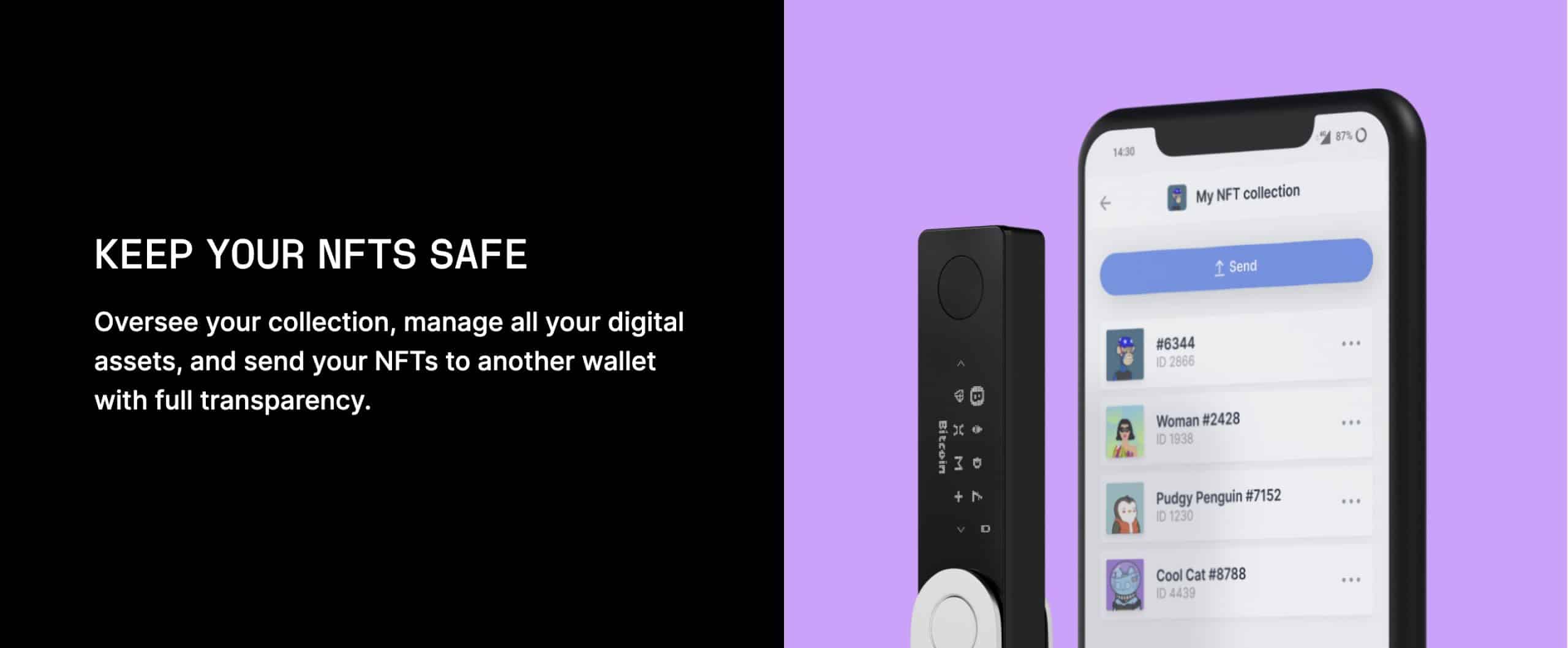
The Ledger Nano S offers support for over 5,500 tokens, and its memory can support up to 100 different apps simultaneously—more are being added all the time, so be sure to follow Ledger on X to get the latest updates on integration and releases.
Furthermore, users can buy and sell cryptocurrencies through the Ledger Live app, where they can also monitor the value of their portfolio in real time. Through this service, they can also stake native blockchain tokens to earn variable APYs.
Pros
- Cheaper than the Nano X and offering the same features (without the Bluetooth)
- Support for over 5,500 tokens
- Support for NFTs
- Buy, sell, and stake cryptocurrencies through Ledger Live
- Connect to Android devices via a cable
Cons
- Less than perfect security record for the Ledger company
- No Bluetooth connectivity like the more expensive Nano X
Trezor Safe 3 – Most Recent Release from Most Trust Hardware Wallet Company
The Trezor Safe 3 comes from SatoshiLabs, the producer of the first hardware wallet and one of the most trusted hardware wallet companies out there. It can be connected to your computer with a USB-C connection, and can store over 9,000 tokens across multiple blockchain networks, with more added all the time—so follow Trezor on X for the latest additions.
The Trezor Safe 3 uses a Secure Elements (EAL6+) chip to store the user’s private keys—the same chip that is used in credit cards and passport—and users can also add a passphrase for further protection for their assets. What’s more, assets on Trezor devices are secured using open-source code.
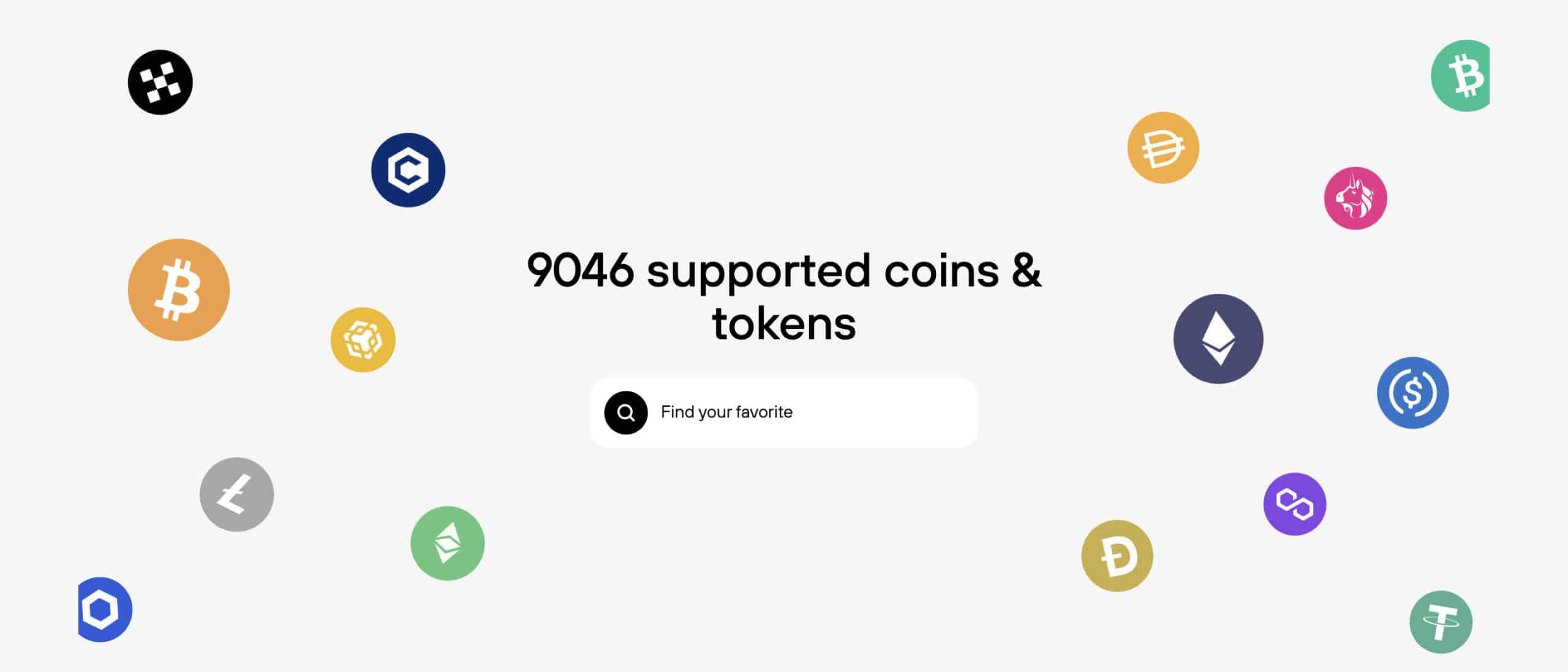
While it doesn’t have Bluetooth, users can still connect their Trezor device to Android devices via cable, allowing for mobile transactions and mobile asset management. Users can manage their assets through the Trezor Suite, and sell and exchange Bitcoin in an anonymous way using the integrated Coinjoin service.
Pros
- Support for over 9,000 tokens
- From the most trusted hardware wallet producers
- Based on open-source code
- Coinjoin integration makes for anonymous Bitcoin transactions
Cons
- No Bluetooth connectivity
How We Rated the Best Wallets for Crypto in Australia
Presenting this list of the best crypto wallets in Australia is all well and good, but to trust it you need to know what factors we took into account when looking at these wallets. Below is a summary of the main factors we considered when building this list.
- Security: Self-custody is a huge part of Web3 and your wallet is only as secure as the manufacturer made it. Wallets with the best security record and audit results score highly here.
- Supported Cryptocurrencies: The more currencies a crypto wallet supports the more opportunity available to users in Web3—supporting more cryptos means a higher rank.
- User-Friendliness: Ultimately, these wallets are built to be used, and they need to be intuitive and easy for new users to grasp.
- Reputation: A reputable name goes a long way in Web3; we also looked at customer ratings from websites like Trustpilot.
- Open or Closed Source: Open source code offers more chances for people to review it and battle-test it, meaning that wallets using open source code will rank higher.
- Costs: Hot wallets are typically free, but the price of cold wallets can vary. While a minor factor, it is still important for the purpose of inclusivity.
What is a Crypto Wallet?
Crypto wallets are an essential part of Web3, securely storing a user’s funds while allowing them to send and receive tokens, connect to dApp, and interact with everything Web3 has on offer.
How do Crypto Wallets Work?
Crypto wallets use a pair of cryptographic keys to prove ownership of funds and to authorize the movement of those funds. This pair of keys are known as a public key and a private key and together they secure your account and blockchain interactions.
- Public Key: This is open to everyone on the system and is used when you want to receive cryptocurrencies from another user, it can be thought of as your account number.
- Private Key: Akin to a password or pin, this is the key that is used to authorize and sign transactions from your wallet. This should never be revealed to anyone.
What is the Difference Between a Hot and a Cold Wallet?
Hot wallets are kept on machines that are connected to the internet, this comes with an increase in convenience and the ability to quickly perform transactions, but also increases their susceptibility to hacking and attacks.
Cold wallets are not connected to the internet, significantly reducing their susceptibility to hacks but also reducing the speed at which a user can interact with their assets. These are typically called hardware wallets and are the best way to store your assets safely.
What’s the Difference Between a Custodial and Non-Custodial Wallet?
A custodian, according to Merriam-Webster, is “one entrusted with guarding and keeping property.”
If a third party controls the keys to your wallet, e.g., if your wallet is on a centralized exchange, then it is a custodial wallet, and they are the custodians of your funds—they are responsible for the security of those funds.
If you control the private keys to your wallet, like with a cold wallet, then this is a non-custodial wallet because you are the one responsible for the security of those funds. You will have a seed phrase that is used to generate these keys should you lose access to your wallet.

How to Set Up a Crypto Wallet in Australia
The process for setting up a crypto wallet is different for custodial and non-custodial wallets. For a custodial wallet, users must simply create an account with the provider, e.g. a centralized exchange, and complete the mandatory KYC requirements to be able to use the platform.
For those looking to set up a non-custodial wallet, like one of the best crypto cold storage wallets in Australia, here are the 5 simple steps you’ll go through:
- Step 1: Follow the steps to connect your hardware wallet to your computer or download your chosen non-custodial wallet from a trusted source.
- Step 2: Begin the setup process and clearly and cleanly write down your seed phrase on a piece of paper. Do not store it digitally, neither as text nor as a photo.
- Step 3: Confirm your seed phrase with the wallet by reentering it into the wallet app.
- Step 4: Create a strong but memorable password for your wallet and save it.
- Step 5: Confirm your password and create your wallet. Your non-custodial wallet is now ready to go!
Once this process is complete, secure your seed phrase where no one you don’t trust can access it as it gives anyone complete access to your wallet.
What Should Australian Users Look for When Choosing a Crypto Wallet?
Everyone’s purpose is different, so what you look for in a wallet may be different from the next person. However, the below list contains some of the most commonly cited decision-making factors.
- Supported Cryptocurrencies: Ensure that the networks you want to transact on are accessible through this wallet.
- Custodial or Non-Custodial: If you’re looking to secure assets in self-custody, make sure to choose a non-custodial wallet.
- Hot or Cold Wallet: If you’re looking to safely store a long-term investment, then pick a cold wallet. If you want to interact with the blockchain regularly then consider a hot wallet.
- Security Features: Besides a password, many wallets will offer features like 2-factor authentication for transactions. Choose a wallet with the security features you need.
- User Friendliness: A wallet should be intuitive to use, lest you get confused or miss the opportunity to make a trade.
- Reputation: The wallet developer’s current reputation is an important indicator of their future performance, pick one you can trust today for a more secure tomorrow.
Conclusion – Choosing the Best Crypto Wallet for You
While these are our choices for the best hot and cold crypto wallets in Australia, what suits each person will vary due to numerous factors including their personal security needs, operational preferences, and which blockchains they want to interact with.
Whichever wallet you end up choosing, it is worth keeping in mind that many in the industry deem the standard security practice to be storing the majority of your funds securely in a cold wallet while keeping enough for daily transactional needs in your hot wallet.
Best Crypto Wallet Australia FAQs
What is the Best Crypto Wallet for Australian Users?
The best crypto wallets in Australia include hot wallets like BybBit, Zengo, and Binance, along with cold wallets like the Ellipal Titan 2.0, Ledger Nano X, and Ledger Nano S Plus. Which you choose will depend on your personal blockchain and crypto needs.
How do I Open a Crypto Wallet?
Opening a crypto wallet is a simple process and varies depending on whether you’re opening a custodial (exchange-based) or non-custodial (browser or mobile-based) wallet. Non-custodial wallet setup requires just a few extra steps.
What’s the Best Crypto Wallet for Beginners?
For beginners, the best crypto wallet is ByBit. It offers token and NFT support for all the top blockchains and can be accessed through your browser or a mobile app.
What is the Best Cold Storage Crypto Wallet?
Overall we recommend the Ellipal Tita 2.0 as the best cold storage wallet as it comes from a well-established hardware wallet provider and comes with the highest level of security.
Are Crypto Wallets Safe?
Crypto wallets are the safest way to store your assets, but users must be careful to choose a wallet provider with an excellent security record. We’ve reviewed the best hot and cold crypto wallets to provide our readers with the safest options for storing their crypto assets.
What Happens if a Crypto Wallet Company Goes Out of Business?
If your crypto wallet is a custodial wallet then you are likely to immediately lose all or part of your funds—and not get those funds returned to you. If, however, you use a non-custodial wallet then your funds will remain yours and secure and it is likely that you’ll be able to continue using the wallet as normal.
References
- Trustpilot.com – Zengo Reviews on Trustpilot
- CNBC.com – Coinbase closes at $328.28 per share in Nasdaq debut, valuing crypto exchange at $85.8 billion
- CoinDesk.com – Ethereum’s Dencun Upgrade Is a Step Toward a Scalable Settlement Layer: Goldman Sachs
- MetaMask.io – Snaps in MetaMask Stable and Where We Go From Here
- Blockworks.co – Solana is coming to MetaMask thanks to Snaps
- GitHub.com – Trezor
- Merriam-Webster.com – Custodian Definition

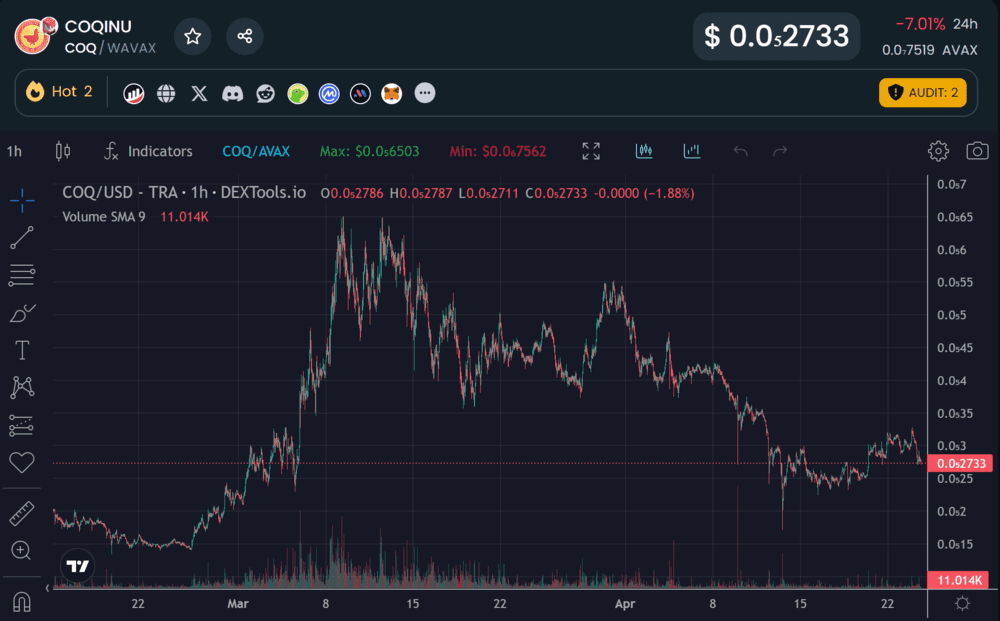
 Michael Graw
Michael Graw 
 Eliman Dambell
Eliman Dambell 

 Eric Huffman
Eric Huffman